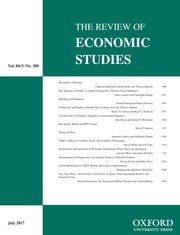
Booij, A., Leuven, E. and Oosterbeek, H. (2017). Ability Peer Effects in University: Evidence from a Randomized Experiment Review of Economic Studies, 84(2):547--578.
-
Affiliated authorsAdam Booij, Hessel Oosterbeek
-
Publication year2017
-
JournalReview of Economic Studies
This article estimates peer effects originating from the ability composition of tutorial groups for undergraduate students in economics. We manipulated the composition of groups to achieve a wide range of support, and assigned students—conditional on their prior ability—randomly to these groups. The data support a specification in which the impact of group composition on achievement is captured by the mean and standard deviation of peers{\textquoteright} prior ability, their interaction, and interactions with students{\textquoteright} own prior ability. When we assess the aggregate implications of these peer effects regressions for group assignment, we find that low- and medium-ability students gain on an average 0.19 SD units of achievement by switching from ability mixing to three-way tracking. Their dropout rate is reduced by 12 percentage points (relative to a mean of 0.6). High-ability students are unaffected. Analysis of survey data indicates that in tracked groups, low-ability students have more positive interactions with other students, and are more involved. We find no evidence that teachers adjust their teaching to the composition of groups.